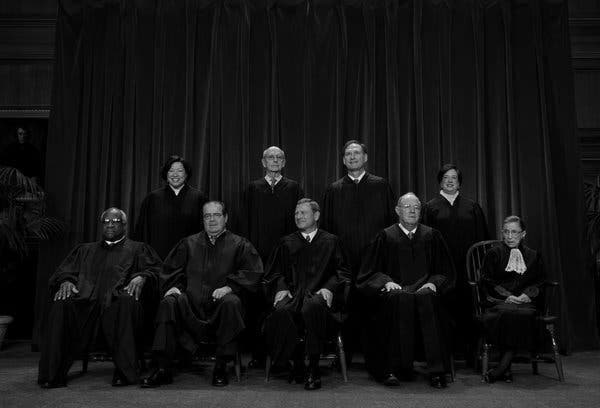Pivotal Dissents and Opinions
Ruth Bader Ginsburg was the first Jewish woman to serve on the Supreme Court. She was appointed to the Supreme Court on June 14, 1993 by President Bill Clinton. During her time on the Supreme Court, she made an impact through her decisions, but more importantly, her dissents to raise awareness and to extend constitutional rights for women.

Doug Mills, Members of the Supreme Court in 2010, The New York Times
Groundbreaking Examples Include:
Ledbetter v. Goodyear Tire Rubber Co
Lilly Ledbetter, an area manager for Goodyear Tire Rubber Co, discovered that she had received lower compensation than her male coworkers for the 19 years she had worked at Goodyear. Ledbetter earned $3,727 per month unlike the lowest-paid male employee who earned $4,286. The Supreme Court ruled 5-4 to reject the case because it was filed too long from the time the original decision was made about her pay. RBG was one of the four justices who dissented. RBG in her dissent said, “In our view, the court does not comprehend, or is indifferent to, the insidious way in which women can be victims of pay discrimination.” The district court that subsequently heard the case incorporated RBG's perspective as they determined a verdict. Ledbetter won the case in 2003 and $3.8 million back for pay and damages.
Virginia v. United States
Virginia prohibited women from attending the Virginia Military Institute. The Supreme Court ruled 7-1 that the Virginia Military Institute had violated the Fourteenth Amendment. RBG authored the majority opinion which made gender discrimination in education illegal. Publicly funded schools had to discontinue the male only admission. “Women seeking and fit for a VMI quality education cannot be offered anything less, under the State’s obligation to afford them genuinely equal protection,” RBG wrote.
Gonzales v. Carhart
The first time the Supreme Court had banned a specific abortion method was in 2007. The court verified Congress’ Partial-Birth Abortion Ban Act of 2003. This upheld the ban of the intact dilation procedure even though it was the safest way to stay away from harming the woman's uterus. In RBG’s dissent, she wrote that the decision “tolerates, indeed applauds, federal intervention to ban nationwide a procedure found necessary and proper in certain cases by the American College of Obstetrics and Gynecologists.”
Hobby Lobby v. Burwell
In Hobby Lobby v. Burwell, the Supreme Court ruled in favor of Hobby Lobby that they could use a religious exception to the Affordable Care Act’s requirement for employers to cover the cost of contraceptives for their female workers, saying that it violated the Religious Freedom Restoration Act. In her dissent, Ruth Bader Ginsburg said, “Approving some religious claims while deeming others unworthy of accommodation could be perceived as favoring one religion over another, the very risk the Establishment Clause was designed to preclude. The court, I fear, has ventured into a minefield.” Ginsburg’s dissent has opened public discourse on the legality of faith-based exemption to other laws regarding women’s health, racial and other discrimination among others.
June 5, 2017, Ruth Bader Ginsburg on the Value of Dissents, The Aspen Institute